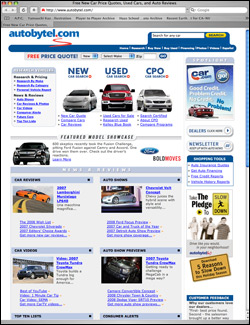Berkeleyan
Before buying a car, be sure to cruise the Web
Knowledge is power in this confusing arena, says Haas prof, especially for those who shy away from showroom bargaining
![]()
| 10 January 2007
Shopping for a new car can drive even the most relaxed consumer over the edge. But new research by a Haas School of Business marketing professor shows that the Internet can help with this often-trying experience by boosting a buyer's negotiating power. "It turns out whether or not you are informed makes a huge difference in what you pay," says Associate Professor Florian Zettelmeyer.
Checking a car's invoice price online and using an Internet car-buying-referral site can help consumers get a lower price at the dealership, Zettelmeyer found in a study of 1,436 car purchases. In a separate analysis, Zettelmeyer showed that buyers get a lower price when car manufacturers offer consumer rebates instead of dealer rebates, primarily because consumers frequently don't know about the latter. Those findings suggest that consumers should check the Internet to find out about dealer rebates before buying a car.
 Many websites are dedicated to helping shoppers get the most bang for their car-buying buck. Those who glean the most accurate information about discounts and rebates use it to shave hundreds of dollars off their final invoice, says Haas School of Business professor Florian Zettelmeyer. |
In a June 2006 article published in the Journal of Marketing Research, Zettelmeyer and his co-authors found that buyers paid about 1.5 percent less for a car when they checked the Internet for the invoice price and used an online car-buying-referral service. That saving equals about $375 (based on an average car price of $25,000) and represents about 22 percent of dealers' average gross profit margin per vehicle.
"For people who dislike the bargaining process, this is a huge deal, because the information gives them the backbone to ask dealers for a larger discount," Zettelmeyer says.
However, one surprising finding was that consumers who like to bargain did not get lower prices when they checked the Internet for information.
"If you are a good bargainer, information doesn't matter," Zettelmeyer says, because good bargainers, by definition, are able to negotiate well with little information. "The Internet here is a great equalizer in a way because it differentially helps those people more who have so far been worse off in car buying."
In a study of automobile rebates, findings from which appeared in the September 2006 issue of the American Economic Review, Zettelmeyer and his co-authors found that 70 to 90 percent of customer rebates from car manufacturers trickle down as discounts to car buyers, while only 30 to 40 percent of dealer rebates from manufacturers are passed through to buyers by dealers - a difference of about $500 for a typical promotion.
Consumers often don't know about dealer rebates, which means, says Zettelmeyer, that car shoppers "are better off if the manufacturer offers a direct-to-consumer rebate as opposed to a dealer rebate."
But some car makers (such as Honda) never offer direct consumer rebates, he notes. For those models, consumers should check the Internet to find out if manufacturers are offering dealer rebates in order to boost their position at the negotiating table.
"$1,000 Cash Back: The Pass-Through of Auto Manufacturer Promotions" is online at flomac.haas.berkeley.edu/~florian/Papers/passthrough.pdf. "How the Internet Lowers Prices: Evidence From Matched Survey and Auto Transaction Data" is at flomac.haas.berkeley.edu/~florian/Papers/howinternetjmr.pdf.

